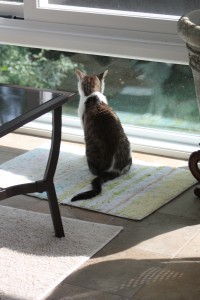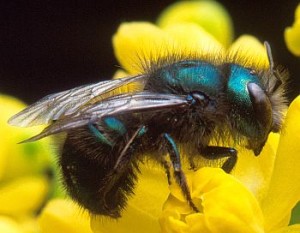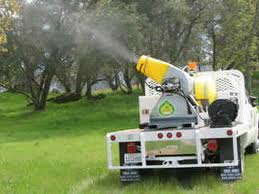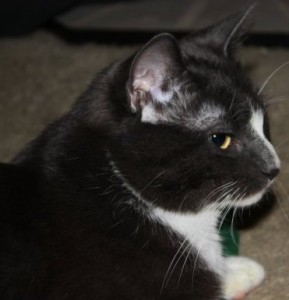Friends, I am so relieved when I survey my habitat surroundings and things are a little messy! When the yard, trees and shrubs are too tidy, I can’t help but worry.
I worry because there are many creatures that live in the shrubs, grass and trees and when things are manicured and groomed too much, our small Friends lose their habitats!
And it is not just the mowing and the trimming that I am talking about. I am worried about the use of pesticides to keep lawns greener than green! Is it really so bad for the grass to be dotted with dandelions and other interesting plants?
Did you know that more than fifty billion honeybees have died within the last year in the United States due to Colony Collapse Disorder?
Bees are social creatures but they are also very smart. When they become sick, they do not return to their colony so as not to infect the other bees. But when all the bees are sick and do not return the queen bee is left alone in the hive. She is then helpless and she too perishes.
But what is making our honeybees sick? I found the answers from our Friends at The Honeybee Conservancy.
A scientific study in 2005 showed that three-quarters of the 66 different pesticides found in one hive were toxic to bees. But even worse, the combination of the toxins increased the poison as much as by 1000 times. This same study found 121 different pesticides in 887 samples of bees, wax, pollen and hives. Scientists believe that pesticides are the reason for Colony Collapse Disorder.
The Honeybee Conservancy told me that our bees are harvesting pollen laced with lethal poison and feeding it to their young. Many of these systemic pesticides are from a family of highly toxic chemicals called neonicotinoids. Bees exposed to these chemicals exhibit symptoms similar to humans afflicted with Parkinson’s disease or Alzheimer’s.
Another thing that makes my fur stand up is mosquito fogging across municipalities. I am not a scientist as you know, I am Gracey, The Tiniest Tiger, but don’t you think if this poison cloud they disperse all over the land is killing mosquitoes, that it is also killing our honeybees, butterflies, fireflies and countless other beneficial insects? Don’t you think it is also harming our feral cousins, and quite honestly all creatures both big and small and humans too?
West Nile Virus is listed as a “rare disease” by the Office of Rare Diseases of the National Institutes of Health. According to the Center for Disease Control in 2008 there were 1030 humans infected with West Nile Virus, 20 fatal cases, in the entire country. Each year 200,000 people are hospitalized for the flu and 36,000 of them die. There is not an epidemic of West Nile Virus in our country yet cities are spraying toxic pesticides all over the population and millions of people and animals are suffering from pesticide poisoning each year. Our health is put at a much higher risk of harm from mosquito fogging than it is from West Nile Virus.
Our Friend Tiny Timmy has been working super hard to let us know about the harmful chemicals in over the counter flea and tick medications for both cats and dogs. In addition to the chemicals well meaning pet parents place on their pets, there are all the other chemicals within and around your household that you may or may not think about being harmful to you and your pets!
Tiny Timmy told me that in the first study of its kind, the
Environmental Working Group found that:
“Just as children ingest pollutants in tap water, play on lawns with pesticide residues, or breathe in an array of indoor air contaminants, so do their pets. But with their compressed lifespan, developing and aging seven or more times faster than children, pets also develop health problems from exposures much more rapidly.”
Tiny Timmy has posted an Official List of Toxins Killing Animals. I urge you to take a look at this list to help protect you and your loved ones.
And while you are thinking about habitat safety, you might want to check out The Cat Fancier’s Association list of Plants that are Toxic to Cats.
Friends, I know this is a super serious topic.
On this beautiful Sunday I ask you to take a moment and think about your habitat and what you can do to help the honeybees and all living creatures both big and small. Here is what we are doing at my habitat.
~We do not spray our lawn and gardens~
~We are planting indigenous plants that beneficial insects like our honeybees need.
~We are letting parts of our yard go wild with wildflowers, shrubs, and grasses so wildlife can thrive
To learn more about what you can do go to The Honeybee Conservancy’s Act Now page.
Thank you for reading this extra serious and extra long post from me. Thank you for being my Friend. I would love to hear what you are doing to help out our honeybees and all living creatures both big and small.
Wishing you all a peaceful Sunday.




I have found that Home depot and Lowe’s as well as other garden centers don’t have a clue about poisonous plants I think simple stickers on pots provided by the nursery or these garden centers should be in place , I have asked the local Home depot to add a warning when selling Lilies but nothing has been done yet it angers me to see unsuspecting consumers planting things where animals will be exposed for possible consumption. I love to hear the hum of the bees in my garden a healthy garden sounds as beautiful as it looks .Thank you Gracie for sharing as always you have our animal friend’s best interest a heart <3
That is a good point Sandeerabbit.
My mom was going to purchase a large Aloe Vera plant and then saw on the label that is was part of the Lily family.
The label did not say that these plants were toxic to cats but it did mention it belonged to the lily family.
Hai Gracey!
Thank yous so muchly for including mes in dis topic. Honey bees and da same pesticides used on pets is not dat far offs. Most over-the-counter (and sum vet brands like Vectra 3D) contain permethrin, which is known to bes highly toxic to bees. It also what most mosquito spraying has in its. It also in most of da lawn and garden products. 2-4-D is anuder lawn product dangerous for mammals and honey bees.
Insteads, yous can use diatomaceous earth. It must bes food grade, but it wills controls fleas, spiders, aphids and oders dat peeps usually sprays fors. It not a chemical (long as yous gets food grade).
I cries for da peeps and pets effected by flea & tick products, but I cries toos for da bees. Dis year we has only seen a handful of bumble bees and bees is so beneficial to us. I coulds not imagine a world widout flowers or widout honey.
Thank yous!
Your Friend,
Tiny Timmy
You are welcome my Friend!
Thank you for everything you do to help protect our cousins.
We have planted a garden of herbs and veggies for 4 yrs now. We love all the fresh veggies and herbs we get from it all. We also compost. It so much fun, giving fresh veggies and fruits to your friends and neighbors and freezing them for winter use! Everyone loves fresh corn in the dead of winter! Love to all.
Happy Sunday Gracie! We too do not use any chemicals whatsoever in our yard or house! We let some of the yard go wild and trim and mow as needed. Its funny you talk about this today, last evening i decided i was going to clean up the back yard a bit. I pulled out the weed eater and set it up, started to use it & i actually thought about the insects homes and bunnies homes, which i know we have and i stopped. i said “too bad for the neighbors, i am here for the lives of the animals”. I have always loved all kinds of wildlife, cant even dispose of a plant if it only has a bit of green. It tugs at my heart strings. We have noticed that there were not many bees at all this year. I bet i could count on my hands how many i actually saw. It is so sad! People dont realize that each and every creature on this earth is here for a reason and we need to protect each and every life! I love Tiny Timmy, i follow him daily. He is a great relayer of information, just as you are! I love you all! Take care of our planet! The Simon Kitties! 🙂
Hi Judy!
Thank you for letting some of your yard go wild! Maybe you can share a photo of your garden! Do you grow vanilla beans?
We don’t use any pesticides on our yard, and Mommy buys as much organic suff as she can. We have lots of flowering plants in our yard, and we see LOTS of bees, thank goodness!
Thanks for stopping by. I am glad that you see lots of bees.
Thanks for publicizing this Gracey! I am happy that in our region they are not doing as much spraying for mosquitos. There used to be lots of spraying because people was afraid of West Nile Virus but now we know this is not a good thing.
Hi Rumpy,
That spraying scare me! It just can’t be good for any living creatures.
Right on, Gracey! My Dad warned me about this kind of thing happening decades ago, and now we are all seeing the results. Folks should try to live as green as they can & eat organically a much as possible (which has helped me LOSE 61 lbs. so far! :D). I planted a garden (organic) this year – including catnip for the neighbor kitties – and lots of flowering herbs for the bees & others. Little steps do add up to a lot of benefits. Cheers to You & All!
Hurrah for you Dr. Jane! I bet the neighbor kitties are super happy!